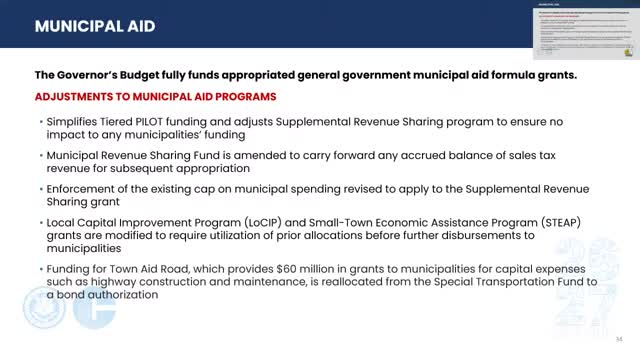Governor Lamont proposes comprehensive tax relief and capital budget reforms for Connecticut
February 07, 2025 | 2025 Legislature CT, Connecticut
This article was created by AI summarizing key points discussed. AI makes mistakes, so for full details and context, please refer to the video of the full meeting. Please report any errors so we can fix them. Report an error »

The Finance Committee of the Connecticut State Legislature convened on February 7, 2025, to discuss the Office of Policy and Management (OPM) budget briefing. The meeting focused on the governor's proposed budget for the upcoming biennium, emphasizing tax relief initiatives and capital budget priorities.
The session began with a review of the committee's past achievements in tax relief under the Lamont administration, highlighting a total of $888 million in tax relief over the last six years. The governor's current proposal includes significant changes aimed at providing further relief to residents and businesses.
Key proposals discussed included an increase in the property tax credit from $300 to $350, which is expected to benefit approximately 800,000 filers at a cost of $85 million. Additionally, the governor proposed the elimination of certain occupational license application and renewal fees, which would provide savings for around 80,000 workers in high-demand professions such as healthcare and education.
The meeting also addressed corporate tax reforms, including the repeal of the capital base tax that affects new and growing companies. This change aims to encourage business growth in Connecticut by removing disincentives for companies that have not yet achieved profitability. Furthermore, the governor proposed to eliminate preferential tax treatments for a small number of companies, ensuring a more equitable tax structure.
In terms of capital budget priorities, the governor's proposal includes $2.5 billion in general obligation bonds for each year of the biennium, focusing on housing affordability, economic development, and climate resiliency. Notable allocations include $825 million for housing initiatives and $1 billion for new school construction.
The committee also discussed the importance of environmental infrastructure projects, particularly in clean water and flood control, with a new fund proposed for quick grants to assist communities affected by catastrophic events.
In conclusion, the Finance Committee's meeting underscored a commitment to fiscal discipline while proposing substantial tax relief and investment in critical areas such as housing and education. The governor's budget aims to support economic growth and address the needs of Connecticut residents, with further discussions and questions anticipated in future sessions.
The session began with a review of the committee's past achievements in tax relief under the Lamont administration, highlighting a total of $888 million in tax relief over the last six years. The governor's current proposal includes significant changes aimed at providing further relief to residents and businesses.
Key proposals discussed included an increase in the property tax credit from $300 to $350, which is expected to benefit approximately 800,000 filers at a cost of $85 million. Additionally, the governor proposed the elimination of certain occupational license application and renewal fees, which would provide savings for around 80,000 workers in high-demand professions such as healthcare and education.
The meeting also addressed corporate tax reforms, including the repeal of the capital base tax that affects new and growing companies. This change aims to encourage business growth in Connecticut by removing disincentives for companies that have not yet achieved profitability. Furthermore, the governor proposed to eliminate preferential tax treatments for a small number of companies, ensuring a more equitable tax structure.
In terms of capital budget priorities, the governor's proposal includes $2.5 billion in general obligation bonds for each year of the biennium, focusing on housing affordability, economic development, and climate resiliency. Notable allocations include $825 million for housing initiatives and $1 billion for new school construction.
The committee also discussed the importance of environmental infrastructure projects, particularly in clean water and flood control, with a new fund proposed for quick grants to assist communities affected by catastrophic events.
In conclusion, the Finance Committee's meeting underscored a commitment to fiscal discipline while proposing substantial tax relief and investment in critical areas such as housing and education. The governor's budget aims to support economic growth and address the needs of Connecticut residents, with further discussions and questions anticipated in future sessions.
View full meeting
This article is based on a recent meeting—watch the full video and explore the complete transcript for deeper insights into the discussion.
View full meeting
